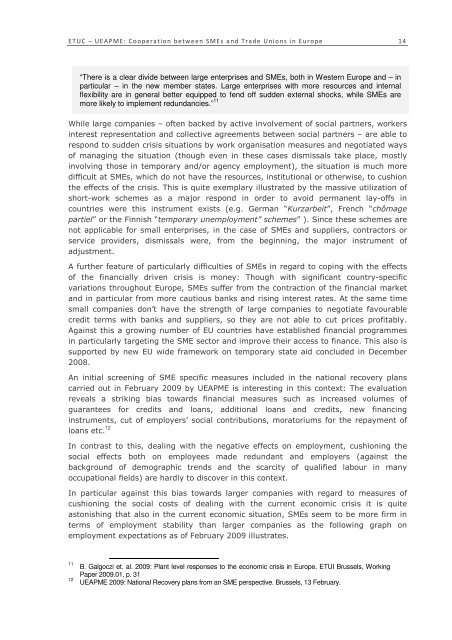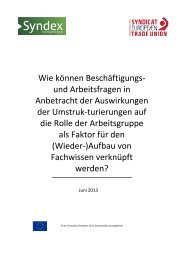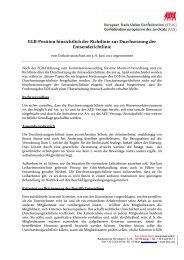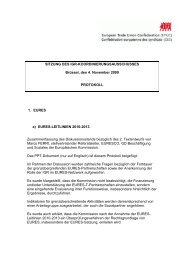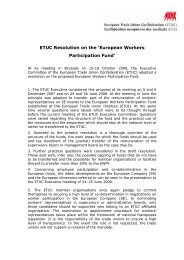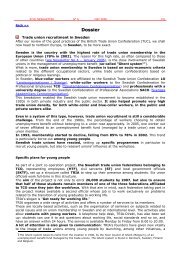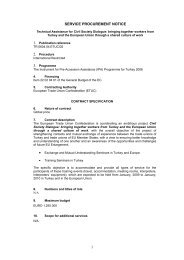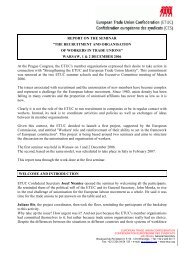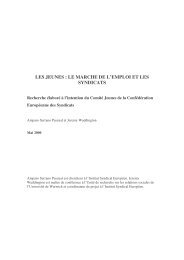Cooperation between SMEs and trade unions in Europe on ... - ETUC
Cooperation between SMEs and trade unions in Europe on ... - ETUC
Cooperation between SMEs and trade unions in Europe on ... - ETUC
Create successful ePaper yourself
Turn your PDF publications into a flip-book with our unique Google optimized e-Paper software.
<strong>ETUC</strong> – UE APME: <str<strong>on</strong>g>Cooperati<strong>on</strong></str<strong>on</strong>g> betw een <str<strong>on</strong>g>SMEs</str<strong>on</strong>g> <str<strong>on</strong>g>and</str<strong>on</strong>g> Trade Unio ns <str<strong>on</strong>g>in</str<strong>on</strong>g> <str<strong>on</strong>g>Europe</str<strong>on</strong>g> 14<br />
“There is a clear divide <str<strong>on</strong>g>between</str<strong>on</strong>g> large enterprises <str<strong>on</strong>g>and</str<strong>on</strong>g> <str<strong>on</strong>g>SMEs</str<strong>on</strong>g>, both <str<strong>on</strong>g>in</str<strong>on</strong>g> Western <str<strong>on</strong>g>Europe</str<strong>on</strong>g> <str<strong>on</strong>g>and</str<strong>on</strong>g> – <str<strong>on</strong>g>in</str<strong>on</strong>g><br />
particular – <str<strong>on</strong>g>in</str<strong>on</strong>g> the new member states. Large enterprises with more resources <str<strong>on</strong>g>and</str<strong>on</strong>g> <str<strong>on</strong>g>in</str<strong>on</strong>g>ternal<br />
flexibility are <str<strong>on</strong>g>in</str<strong>on</strong>g> general better equipped to fend off sudden external shocks, while <str<strong>on</strong>g>SMEs</str<strong>on</strong>g> are<br />
more likely to implement redundancies.” 11<br />
While large companies – often backed by active <str<strong>on</strong>g>in</str<strong>on</strong>g>volvement of social partners, workers<br />
<str<strong>on</strong>g>in</str<strong>on</strong>g>terest representati<strong>on</strong> <str<strong>on</strong>g>and</str<strong>on</strong>g> collective agreements <str<strong>on</strong>g>between</str<strong>on</strong>g> social partners – are able to<br />
resp<strong>on</strong>d to sudden crisis situati<strong>on</strong>s by work organisati<strong>on</strong> measures <str<strong>on</strong>g>and</str<strong>on</strong>g> negotiated ways<br />
of manag<str<strong>on</strong>g>in</str<strong>on</strong>g>g the situati<strong>on</strong> (though even <str<strong>on</strong>g>in</str<strong>on</strong>g> these cases dismissals take place, mostly<br />
<str<strong>on</strong>g>in</str<strong>on</strong>g>volv<str<strong>on</strong>g>in</str<strong>on</strong>g>g those <str<strong>on</strong>g>in</str<strong>on</strong>g> temporary <str<strong>on</strong>g>and</str<strong>on</strong>g>/or agency employment), the situati<strong>on</strong> is much more<br />
difficult at <str<strong>on</strong>g>SMEs</str<strong>on</strong>g>, which do not have the resources, <str<strong>on</strong>g>in</str<strong>on</strong>g>stituti<strong>on</strong>al or otherwise, to cushi<strong>on</strong><br />
the effects of the crisis. This is quite exemplary illustrated by the massive utilizati<strong>on</strong> of<br />
short-work schemes as a major resp<strong>on</strong>d <str<strong>on</strong>g>in</str<strong>on</strong>g> order to avoid permanent lay-offs <str<strong>on</strong>g>in</str<strong>on</strong>g><br />
countries were this <str<strong>on</strong>g>in</str<strong>on</strong>g>strument exists (e.g. German “Kurzarbeit”, French “chômage<br />
partiel” or the F<str<strong>on</strong>g>in</str<strong>on</strong>g>nish “temporary unemployment” schemes” ). S<str<strong>on</strong>g>in</str<strong>on</strong>g>ce these schemes are<br />
not applicable for small enterprises, <str<strong>on</strong>g>in</str<strong>on</strong>g> the case of <str<strong>on</strong>g>SMEs</str<strong>on</strong>g> <str<strong>on</strong>g>and</str<strong>on</strong>g> suppliers, c<strong>on</strong>tractors or<br />
service providers, dismissals were, from the beg<str<strong>on</strong>g>in</str<strong>on</strong>g>n<str<strong>on</strong>g>in</str<strong>on</strong>g>g, the major <str<strong>on</strong>g>in</str<strong>on</strong>g>strument of<br />
adjustment.<br />
A further feature of particularly difficulties of <str<strong>on</strong>g>SMEs</str<strong>on</strong>g> <str<strong>on</strong>g>in</str<strong>on</strong>g> regard to cop<str<strong>on</strong>g>in</str<strong>on</strong>g>g with the effects<br />
of the f<str<strong>on</strong>g>in</str<strong>on</strong>g>ancially driven crisis is m<strong>on</strong>ey: Though with significant country-specific<br />
variati<strong>on</strong>s throughout <str<strong>on</strong>g>Europe</str<strong>on</strong>g>, <str<strong>on</strong>g>SMEs</str<strong>on</strong>g> suffer from the c<strong>on</strong>tracti<strong>on</strong> of the f<str<strong>on</strong>g>in</str<strong>on</strong>g>ancial market<br />
<str<strong>on</strong>g>and</str<strong>on</strong>g> <str<strong>on</strong>g>in</str<strong>on</strong>g> particular from more cautious banks <str<strong>on</strong>g>and</str<strong>on</strong>g> ris<str<strong>on</strong>g>in</str<strong>on</strong>g>g <str<strong>on</strong>g>in</str<strong>on</strong>g>terest rates. At the same time<br />
small companies d<strong>on</strong>’t have the strength of large companies to negotiate favourable<br />
credit terms with banks <str<strong>on</strong>g>and</str<strong>on</strong>g> suppliers, so they are not able to cut prices profitably.<br />
Aga<str<strong>on</strong>g>in</str<strong>on</strong>g>st this a grow<str<strong>on</strong>g>in</str<strong>on</strong>g>g number of EU countries have established f<str<strong>on</strong>g>in</str<strong>on</strong>g>ancial programmes<br />
<str<strong>on</strong>g>in</str<strong>on</strong>g> particularly target<str<strong>on</strong>g>in</str<strong>on</strong>g>g the SME sector <str<strong>on</strong>g>and</str<strong>on</strong>g> improve their access to f<str<strong>on</strong>g>in</str<strong>on</strong>g>ance. This also is<br />
supported by new EU wide framework <strong>on</strong> temporary state aid c<strong>on</strong>cluded <str<strong>on</strong>g>in</str<strong>on</strong>g> December<br />
2008.<br />
An <str<strong>on</strong>g>in</str<strong>on</strong>g>itial screen<str<strong>on</strong>g>in</str<strong>on</strong>g>g of SME specific measures <str<strong>on</strong>g>in</str<strong>on</strong>g>cluded <str<strong>on</strong>g>in</str<strong>on</strong>g> the nati<strong>on</strong>al recovery plans<br />
carried out <str<strong>on</strong>g>in</str<strong>on</strong>g> February 2009 by UEAPME is <str<strong>on</strong>g>in</str<strong>on</strong>g>terest<str<strong>on</strong>g>in</str<strong>on</strong>g>g <str<strong>on</strong>g>in</str<strong>on</strong>g> this c<strong>on</strong>text: The evaluati<strong>on</strong><br />
reveals a strik<str<strong>on</strong>g>in</str<strong>on</strong>g>g bias towards f<str<strong>on</strong>g>in</str<strong>on</strong>g>ancial measures such as <str<strong>on</strong>g>in</str<strong>on</strong>g>creased volumes of<br />
guarantees for credits <str<strong>on</strong>g>and</str<strong>on</strong>g> loans, additi<strong>on</strong>al loans <str<strong>on</strong>g>and</str<strong>on</strong>g> credits, new f<str<strong>on</strong>g>in</str<strong>on</strong>g>anc<str<strong>on</strong>g>in</str<strong>on</strong>g>g<br />
<str<strong>on</strong>g>in</str<strong>on</strong>g>struments, cut of employers’ social c<strong>on</strong>tributi<strong>on</strong>s, moratoriums for the repayment of<br />
loans etc. 12<br />
In c<strong>on</strong>trast to this, deal<str<strong>on</strong>g>in</str<strong>on</strong>g>g with the negative effects <strong>on</strong> employment, cushi<strong>on</strong><str<strong>on</strong>g>in</str<strong>on</strong>g>g the<br />
social effects both <strong>on</strong> employees made redundant <str<strong>on</strong>g>and</str<strong>on</strong>g> employers (aga<str<strong>on</strong>g>in</str<strong>on</strong>g>st the<br />
background of demographic trends <str<strong>on</strong>g>and</str<strong>on</strong>g> the scarcity of qualified labour <str<strong>on</strong>g>in</str<strong>on</strong>g> many<br />
occupati<strong>on</strong>al fields) are hardly to discover <str<strong>on</strong>g>in</str<strong>on</strong>g> this c<strong>on</strong>text.<br />
In particular aga<str<strong>on</strong>g>in</str<strong>on</strong>g>st this bias towards larger companies with regard to measures of<br />
cushi<strong>on</strong><str<strong>on</strong>g>in</str<strong>on</strong>g>g the social costs of deal<str<strong>on</strong>g>in</str<strong>on</strong>g>g with the current ec<strong>on</strong>omic crisis it is quite<br />
ast<strong>on</strong>ish<str<strong>on</strong>g>in</str<strong>on</strong>g>g that also <str<strong>on</strong>g>in</str<strong>on</strong>g> the current ec<strong>on</strong>omic situati<strong>on</strong>, <str<strong>on</strong>g>SMEs</str<strong>on</strong>g> seem to be more firm <str<strong>on</strong>g>in</str<strong>on</strong>g><br />
terms of employment stability than larger companies as the follow<str<strong>on</strong>g>in</str<strong>on</strong>g>g graph <strong>on</strong><br />
employment expectati<strong>on</strong>s as of February 2009 illustrates.<br />
11<br />
B. Galgoczi et. al. 2009: Plant level resp<strong>on</strong>ses to the ec<strong>on</strong>omic crisis <str<strong>on</strong>g>in</str<strong>on</strong>g> <str<strong>on</strong>g>Europe</str<strong>on</strong>g>, ETUI Brussels, Work<str<strong>on</strong>g>in</str<strong>on</strong>g>g<br />
Paper 2009.01, p. 31<br />
12<br />
UEAPME 2009: Nati<strong>on</strong>al Recovery plans from an SME perspective. Brussels, 13 February.


